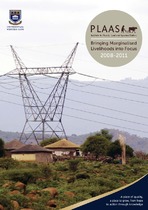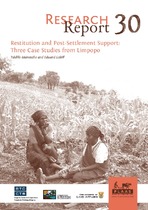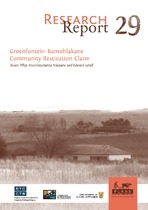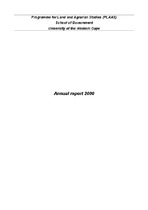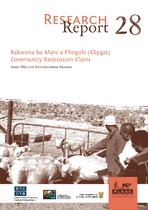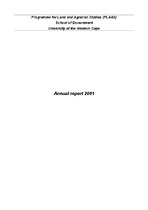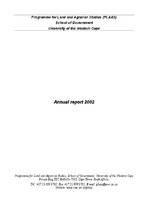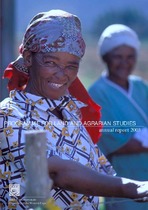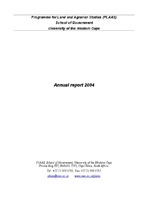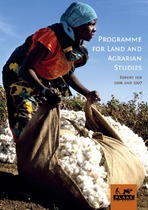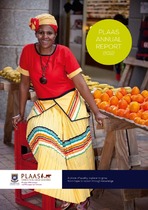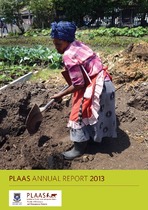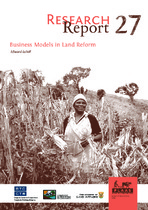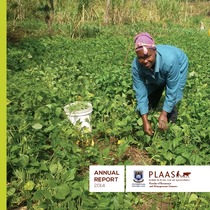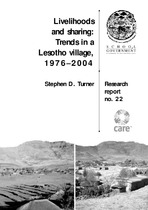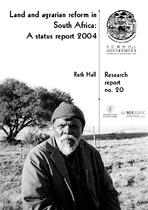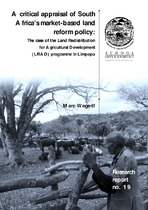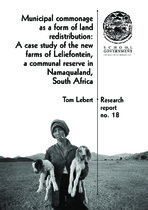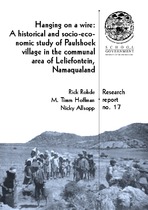Faculty of Economic and Management Sciences: Recent submissions
Now showing items 681-700 of 1101
-
Bringing marginalised livelihoods into focus, 2008-2011
(Institute for Poverty Land and Agrarian Studies (PLAAS), 2012) -
Restitution and post-settlement support: Three case studies from Limpopo
(Institute for Poverty, Land and Agrarian Studies, University of the Western Cape, 2007)This study examines the experience of land reform beneficiaries after land acquisition in three communal property associations (CPAs) in Limpopo province, namely Munzhedzi, Ximange and Mavungeni CPAs. In all three cases, ... -
Groenfontein–Ramohlakane community restitution claim
(Institute for Poverty, Land and Agrarian Studies, University of the Western Cape, 2007)This diagnostic study examines the efforts of the Groenfontein-Ramohlakane Trust to develop and use the land in (Mpumalanga) that has been restored to the community in terms of the Restitution of Land Rights Act 22 of ... -
Annual report 2000
(Institute for Poverty Land and Agrarian Studies (PLAAS), 2001)The Programme for Land and Agrarian Studies (PLAAS) focuses on the land restitution and redistribution programmes initiated by the post-apartheid democratic state; land tenure reform; emerging regimes of natural resource ... -
Bakwena ba Mare a Phogole (Klipgat) community restitution claim
(Institute for Poverty, Land and Agrarian Studies, University of the Western Cape, 2007)This diagnostic study examines the case of the restoration of the remaining extent of the farm Klipgat 18 IQ, falling under the Ventersdorp Local Municipality in the North West province, to the Bakwena ba Mare Phogole ... -
Annual report 2001
(Institute for Poverty Land and Agrarian Studies (PLAAS), 2002)PLAAS continues to grow and to take on new projects and staff. This presents a number of challenges, not least of which is the sustainability of such growth. The year 2001 saw the completion of a twelve month-long ... -
Annual report 2002
(Institute for Poverty Land and Agrarian Studies (PLAAS), 2003)The year 2002 was an extremely busy one for PLAAS staff, and saw the initiation of many new projects and activities, some of them qualitatively different to anything undertaken before. These included an in-depth, national ... -
Annual report 2003
(Institute for Poverty Land and Agrarian Studies (PLAAS), 2004)Applied social science researchers generally want to see their research influence policy and practice; those of a more activist bent seek to ‘change the world, not simply to interpret it’.1 In its mission statement ... -
Annual report 2004
(Institute for Poverty Land and Agrarian Studies (PLAAS), 2005)The wider context of our research and training, and the ultimate rationale for establishing and maintaining a centre such as PLAAS, is the key challenge of deeply entrenched poverty, as well as the inequality to which ... -
Annual report 2006-2007
(Institute for Poverty Land and Agrarian Studies (PLAAS), 2008)Over the past two years the contradictions inherent in South Africa’s post-apartheid growth and development path have become increasingly evident. Growth has not managed to reduce very high levels of unemployment to a ... -
Annual report 2012
(Institute for Poverty Land and Agrarian Studies (PLAAS), 2013)In much of the global South the instability in global financial systems continued to have dire effects – and there were many worrying signs that the serious food price inflation the world experienced in 2008 would return. ... -
PLAAS annual report 2013
(Institute for Poverty Land and Agrarian Studies (PLAAS), 2014)This Act is most commonly associated with the consolidation of the colonial ‘land grab’, which had gathered force during the previous 200 years, and with helping to create the framework for the infamous ‘Black Spot ... -
Business models in land reform
(Institute for Poverty, Land and Agrarian Studies, University of the Western Cape, 2007)This paper reviews the types of business models, or landuse models, being implemented in land reform projects involving the transfer of rural land to communities and other groups in South Africa, under both the restitution ... -
Annual report 2014
(Institute for Poverty Land and Agrarian Studies (PLAAS), 2015)Very often, in our work at PLAAS, we encounter two common misunderstandings about what it is that we do and why it is important. One common misunderstanding is that we are some sort of technical agricultural education ... -
Livelihoods and sharing: Trends in a Lesotho village, 1976–2004
(Institute for Poverty, Land and Agrarian Studies, University of the Western Cape, 2005)In 2004 I was fortunate enough to be able to return to Ha Tumahole, the village in Lesotho where I undertook research on farming and livelihoods in 1976–77, and spend four weeks learning about what had changed in ... -
Joint ventures and livelihoods in emerging small-scale irrigation schemes in Greater Sekhukhune District: Perspectives from Hereford
(Institute for Poverty, Land and Agrarian Studies, University of the Western Cape, 2005)Small-scale irrigation farming is envisaged as playing a progressively larger role in rural development and in reducing some of the inequalities inherent in South Africa’s space economy. The promotion of entry by black ... -
Land and agrarian reform in South Africa: A status report 2004
(Institute for Poverty, Land and Agrarian Studies, University of the Western Cape, 2004)This is the third in a series of ‘status reports’ on land and agrarian reform in South Africa published by the Programme for Land and Agrarian Studies (PLAAS). These reports set out to assess progress, problems and ... -
A critical appraisal of South Africa’s market-based land reform policy: The case of the Land Redistribution for Agricultural Development (LRAD) programme in Limpopo
(Institute for Poverty, Land and Agrarian Studies, University of the Western Cape, 2004)In 1996 less than 1% of the population owned and controlled over 80% of farm land. This 1% was part of the 10.9% of the population classified as white (Stats SA 2000). Meanwhile, the 76.7% of the population that is ... -
Municipal commonage as a form of land redistribution: A case study of the new farms of Leliefontein, a communal reserve in Namaqualand, South Africa
(Institute for Poverty, Land and Agrarian Studies, University of the Western Cape, 2004)This paper examines the implementation of a quasi-commercial land use system on newly acquired municipal commonage in Leliefontein, a former ‘coloured reserve’ in Namaqualand, Northern Cape. This land has been ... -
Hanging on a wire: A historical and socio-eco- nomic study of Paulshoek village in the communal area of Leliefontein, Namaqualand
(Institute for Poverty, Land and Agrarian Studies, University of the Western Cape, 2003)Namaqualand is often considered an anomaly in South African social science research because of its distinct cultural, social and environmental conditions. No doubt, Namaqualand has many extremes: a sparse population, ...

